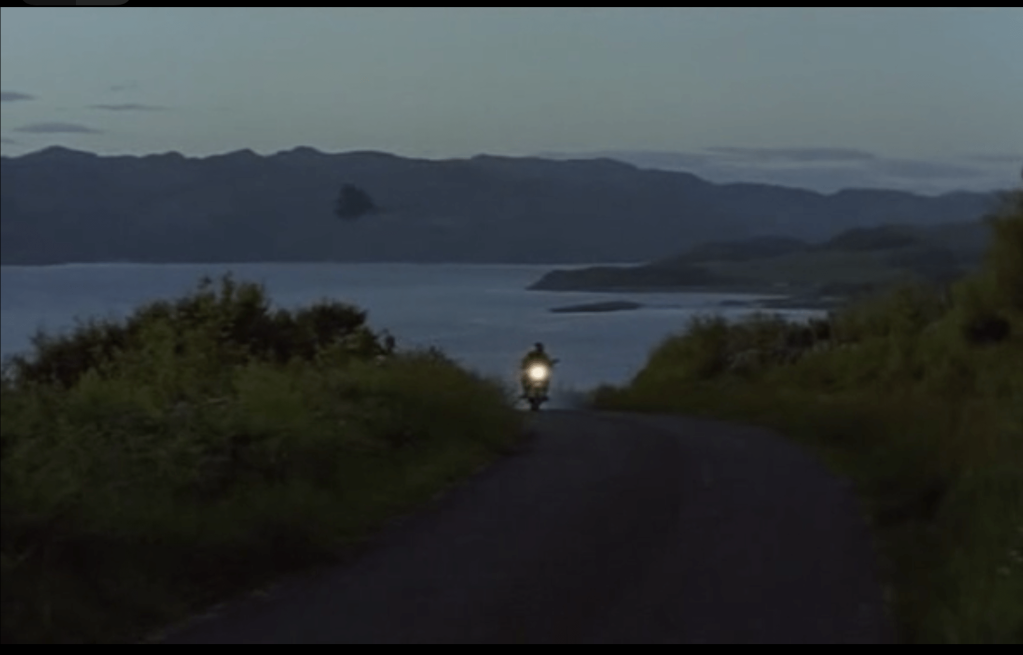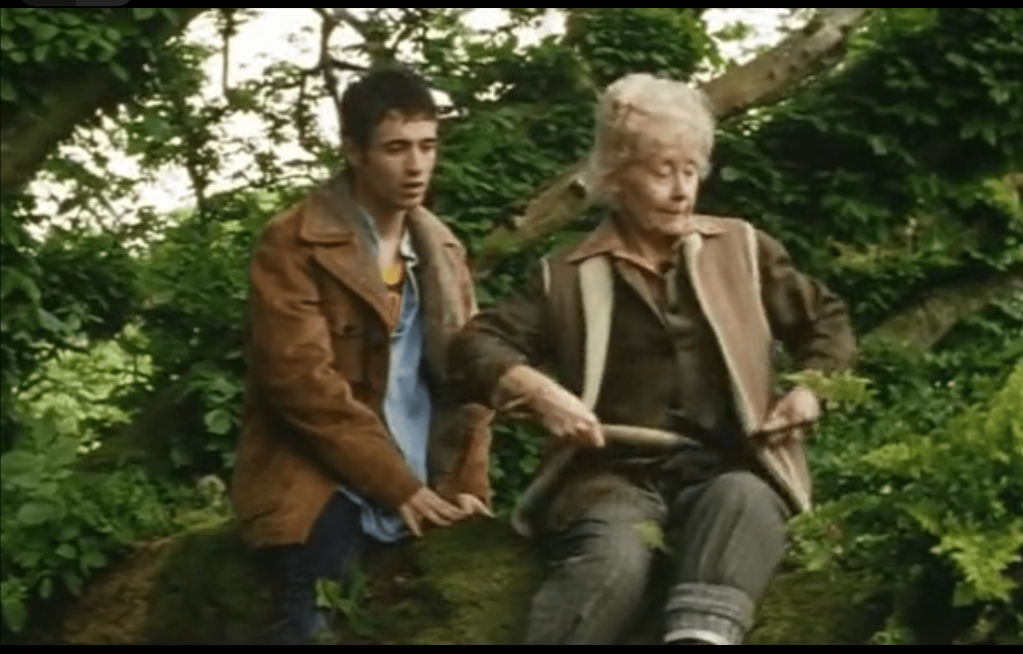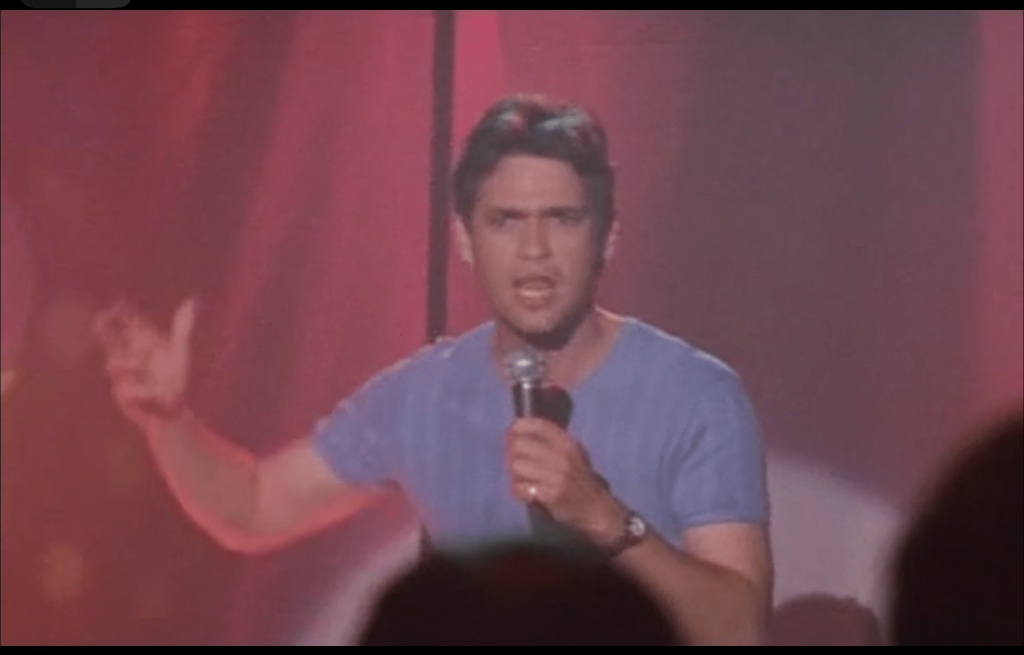
“It’s a saying. My gran would use it if someone died. She’d say, “He’s away the crow road.”
This post is part of the Home Sweet Home blogathon co-hosted by Gil at Realweegiemidget Reviews and Rebecca at Taking Up Room. Home for me is Scotland so I’ve chosen Gavin Millar’s TV mini-series The Crow Road, adapted for television by Brian Elsley from the novel by Iain Banks which aired in the UK in 1996. It’s a series about how grief affects a family and the stories people tell themselves to try and cope with loss, but like most of Banks work it’s also darkly funny and has some wonderful dialogue.

The Crow Road begins with two contrasting journeys from Glasgow to the town of Lochgair on the West Coast. In a brief opening scene Rory McHoan (Peter Capaldi) leaves his flat in Glasgow and sets out on his motorcycle, while his nephew Prentice (Joseph McFadden) explains in voice-over how his uncle has been missing ever since that day seven years ago. Now Prentice is making the same journey. The novel begins with a memorable first line, but Elsley wisely opens with the mystery and marks out Rory and Prentice as being kindred spirits. Only when Prentice arrives late to his gran’s funeral still wearing his 90s’ student gear do we get the immortal line, “It was the day my grandmother exploded.” Gudrun Ure plays granny, and is first seen in flashback up a tree pruning branches, a precarious position for anybody her age, but older Scots will remember her as the lead in Supergran (1985-87), a uniquely Scottish take on the superhero genre, so maybe she leapt up there in a single bound.

It was his grandmother who gave Prentice the task of finding Rory a year earlier, but it’s only with her death that he really begins to investigate his uncle’s disappearance. It’s one of a number of tragedies to affect Prentice in his young life and he’s searching for some kind of meaning about these experiences. As well as Rory’s going missing his Auntie Fiona (Stella Gonet) died in a car crash when he was a child, and more recently his friend Darren (Martin Ledwith) took his own life. The latter’s suicide led to a falling out with his father Kenneth (Bill Paterson). After Prentice and his friends took the car Darren killed himself in down to the water and burned it, Kenneth ridiculed the gesture as “pseudo-religious” pointing out all they had done was deprived a mother of her only means of transport. They haven’t spoken since. While Banks clearly shares Kenneth’s atheistic worldview, there is an otherness present in The Crow Road. A suggestion there are things beyond our ken at work here.

Despite the complex (yet easy to follow) narrative structure The Crow Road also feels similar to other more outwardly conventional dramas about small Scottish communities populated by eccentrics. Like most middle-class Scottish families there’s a Tory, Uncle Fergus (David Robb), a local aristocrat once married to Fiona and now a widower. Uncle Hamish (Paul Young) turned to religion after her death and has now formed his own breakaway Christian sect and demands divine retribution against the Khmer Rouge while saying grace before his tea. Prentice is well-liked by those around him but as his grandmother says “generally thought to be a bit useless.” Before returning home to Lochgair his main concern apart from occasionally wondering about the existence of God was an essay on Wittgenstein he couldn’t be arsed finishing. Most of pals from the village are local kids from working-class families but in small towns people from a place tend to mix together. It’s the incomers who keep to themselves. He’s closest to Ashley (Valerie Edmond), Darren’s younger sister and the two share a bond over their mutual losses. He’s got an older brother Lewis (Dougray Scott), who’s making a name for himself on the Edinburgh stand-up circuit and just got a spot opening for 90s’ comedy double act Lee & Herring who Prentice rightly points out “aren’t funny.” Although Lewis thinks he’s an edgy “anarcho socialist” comedian he tells lame jokes about his love life and is selling out for TV gigs.

So much about The Crow Road is about storytelling and being guided by the voices who went before us. Rory was a successful travel writer but had changed direction and was working on a family history. Prentice follows in his uncle’s footsteps, taking on this journey into the past but also hoping that it will lead him to Rory. For this he needs Ashley to boot up Rory’s 1980s’ laptop so he can read the massive LP sized floppy disks his uncle’s writing was stored on. Kenneth too is a storyteller, a writer of children’s books with titles like The Legend Of The Mythosaurus. Prentice recalls his father trying out these stories on him and the child being full of wonder. Kenneth taught his son to ask questions, to think for himself, and yet is exasperated when Prentice rejects his pragmatic godless worldview for superstition. Despite the distance between them they’re more alike than they care to admit. Kenneth believes Rory is alive, because every month a letter arrives for him containing a signifier of a childhood secret only they share. Something Prentice is immediately sceptical about when his father insists this is proof of life.

Each episode is named after somebody whose story becomes the main focus of that episode. Prentice, Kenneth, Fergus, Rory. Events unfold using flashbacks as the story flits between past and present as Prentice uncovers more about his family and recalls his own childhood memories. While Rory’s absence haunts the narrative, Prentice conjures up a ghostly version of his uncle from out of his own psyche, An imaginary figure still clad in the same biker gear he went missing in, guiding Prentice towards things he already knows but hasn’t quite worked out yet. “It’s all there Prent.”

Director Gavin Millar has had a long and eclectic career. He’s best known for collaborating with Jim Henson on Dreamchild (1985), a haunting biopic about Alice Liddell, the woman who inspired Lewis Carroll’s Alice in Wonderland. In his younger days at the BBC Millar once directed a documentary on Michael Powell interviewing him as he worked at Francis Ford Coppola’s Zoetrope Studio. The Crow Road shares a sensibility with Powell’s two films shot in Scotland, Edge of the World (1937), and I Know Where I’m Going! (1945). The feeling that this land shapes people and makes them who they are. By the end it seems Prentice will be staying in Lochgair, though the possibility of an escape abroad with Ashley seems a distant possibility, he’ll remain at home, a storyteller like his father and uncle, the keeper of his family’s secrets.
